Finding a virtual private network (VPN) that can reliably bypass heavy internet censorship and surveillance in the Middle East can be challenging. Countries across the region restrict access to numerous sites and apps, making a secure and fast VPN essential.
In this comprehensive guide, I‘ll explore the top VPNs for unblocking geo-restricted content and protecting your privacy in the Middle East, outlining the key factors that make them the best options in 2024.
Why You Absolutely Need a VPN in the Middle East
Many Middle Eastern countries engage in strict internet filtering and monitoring. Saudi Arabia alone blocks over 400,000 websites spanning numerous categories – pornography, gambling, social media, political opposition, LGBTQ+ resources and more [1]. Even search engines like Google limit results to comply with "local laws and cultural norms" [2].
Some recent examples of internet censorship in the region include:
- UAE‘s 2021 block of Microsoft‘s Skype, Google Meet, Zoom and other web conferencing apps [3]
- Saudi Arabia‘s 2022 ban on private calls made through apps like WhatsApp, Skype and FaceTime [4]
- Turkey‘s periodic blocking of Wikipedia since 2017 over "terrorism" content [5]
- Iran‘s restrictions on Instagram and WhatsApp amid 2021 election protests [6]
According to a 2020 report, the Middle East overall has the largest percentage of internet users lacking access to free and open online content [7].
With pervasive internet censorship, surveillance and even hacking of government resources occurring [8], a VPN is essential to browse freely and securely. The top VPN benefits in the Middle East include:
- Bypass geo-blocks and access restricted apps, sites and social media
- Encrypt traffic to prevent snooping by ISPs, wifi providers and agencies
- Hide IP address and physical location from prying eyes
- Securely work remotely by tunneling into a company network
- Safely use public WiFi hotspots by encrypting connections
- Unblock more content on streaming platforms like Netflix, Hulu, etc.
Without a VPN, your sensitive online activities and data are extremely exposed. A premium VPN keeps you private and anonymous.
3 Best VPNs for Privacy & Security in the Middle East
Based on extensive testing and research, these are my top recommendations for using a VPN in the Middle East right now:
| VPN | Starting Price | Server Locations | Strong Encryption | No Logging Policy | Unblocks Netflix | Simultaneous Connections |
|---|---|---|---|---|---|---|
| NordVPN | $3.29/month | 5,331+ | AES-256 | Yes | Yes | 6 |
| ExpressVPN | $8.32/month | 3,000+ | AES-256 | Yes | Yes | 5 |
| Surfshark | $2.49/month | 3,200+ | AES-256 | Yes | Yes | Unlimited |
1. NordVPN – Best Overall
With over 5,300 worldwide servers, NordVPN is my top recommendation for an all-around stellar VPN service in the Middle East.
Some key advantages:
- Blazing speeds for HD streaming and fast downloads thanks to widespread servers and protocols like NordLynx (WireGuard).
- Onion Over VPN feature masks VPN traffic to bypass blocks. Obfuscated servers disguise VPN usage.
- Middle Eastern servers available in Turkey and UAE provide fast, nearby connections.
- Leading AES-256 encryption, VPN protocols (OpenVPN, IKEv2/IPSec) and advanced features like Double VPN, kill switch and DNS leak protection for ironclad privacy.
- Zero logs policy independently audited for peace of mind. Does not store any user data or browsing history.
- Unblocks major streaming services like Netflix, Hulu, Disney+, BBC iPlayer, and Prime Video with ease.
- Intuitive apps for Windows, Mac, iOS, Android, Linux and routers enable quick, secure setup.
With an extensive server network, military-grade security and excellent speeds, NordVPN is hard to beat for Middle East usage.
[Visit NordVPN](insert affiliate link here)2. ExpressVPN – Fastest Speeds
ExpressVPN is renowned for its blazing connection speeds and network of 3,000+ global VPN servers.
Main advantages:
- Lightning fast speeds – ranked one of the fastest VPNs for streaming, gaming, torrenting and normal browsing.
- 160+ locations including dedicated Middle Eastern servers located in Turkey and UAE.
- Uses TrustedServer technology for a faster, more secure network compared to traditional VPNs.
- Leading protocols like Lightway and OpenVPN offer 256-bit AES encryption. Perfect for public WiFi security.
- No traffic or activity logs. Independently audited for privacy assurance.
- Unblocks Netflix, Prime Video, BBC iPlayer, Hulu and other top streaming platforms.
- Simple to use apps for Windows, Mac, iOS, Android, Linux and routers.
- 24/7 live chat support in case any connection issues occur.
When you need blazing speeds along with ironclad security, ExpressVPN excels in the Middle East and worldwide.
[Visit ExpressVPN](insert affiliate link here)3. Surfshark – Most Affordable
If you‘re looking for an ultra low-cost but highly capable VPN, Surfshark is the best budget option at just $2.49 monthly.
Key features:
- Unlimited device connections allow using Surfshark on all your gadgets.
- 3,200+ servers in over 100 countries provide many nearby choices.
- Next-gen WireGuard protocol available for speedy, stable connections.
- AES-256 encryption, MultiHop, whitelisting and other privacy tools keep data secure.
- Strict no-logs policy ensures anonymous browsing.
- Unblocks popular sites and services like Netflix, Hulu, BBC iPlayer, Amazon Prime Video.
- Apps for Windows, Mac, iOS, Android, Linux and browser extensions.
- 30-day money back guarantee to try the service risk-free.
For budget-conscious users wanting robust security and unlimited device coverage, Surfshark is a top pick.
[Visit Surfshark](insert affiliate link here)VPN Protocol Comparison
VPN providers use different protocols to encrypt your traffic, each with their own strengths:
| Protocol | Speed | Reliability | Security | Device Support |
|---|---|---|---|---|
| OpenVPN | Average | Good | Strong | Apps for most devices |
| IKEv2/IPSec | Very Fast | Good | Strong | iOS, Android, Windows (not Mac/Linux) |
| WireGuard | Extremely Fast | Very Good | Strong | Apps for most devices |
OpenVPN offers a great balance of speed and security on all major platforms. IKEv2 excels for mobile devices, while WireGuard is the newest, fastest protocol. Top services offer a choice of protocols.
Advanced VPN Features to Look For
Beyond basic privacy and bypassing geo-blocks, some handy advanced features to look for in a premium VPN include:
- Kill Switch – Severes internet access if the VPN disconnects to prevent data leaks
- Split Tunneling – Only routes selected apps through the VPN tunnel for flexibility
- Port Forwarding – Allows torrenting and other peer-to-peer connections for full speeds
- SOCKS5 Web Proxy – Routes web traffic through an encrypted proxy for added privacy
- Tor over VPN – Allows accessing .onion sites over the Tor network via the VPN app
- Ad & Tracker Blocking – Prevents ads, malware and tracking for safer browsing
- DNS Leak Protection – Prevents IP address leaks for total privacy
The more security tools offered, the better for masking your online activities in the Middle East‘s high-risk digital environment.
Securing Your VPN Connection
Using a VPN in the Middle East takes more than just installing an app. Follow these tips to maximize privacy and security:
- Use a paid VPN – Free services often have major privacy and speed downsides.
- Enable the VPN‘s kill switch to prevent data leaks if connections drop.
- Change passwords regularly and use strong, unique ones for your VPN account.
- Update VPN apps frequently to get the latest protocols and security fixes.
- Verify for DNS and IP leaks to confirm your identity is fully hidden.
- Use antivirus software to catch any malware, as VPNs don‘t provide full antivirus protection.
- Enable WiFi security features like VPNs‘ auto-connect when joining public networks.
- Don‘t use VPNs on corporate or government networks as this can violate terms of use.
Following best practices ensures you stay fully secure and private across all your Middle East browsing.
Why Free VPNs Are Too Risky
It can be tempting to use free VPN services in regions like the Middle East to reduce costs. However, free VPNs have significant downsides:
- Weak or no encryption compared to paid services – data isn‘t as secure. Hackers can breach connections.
- Usage and bandwidth restrictions seriously limit how much you can browse or download.
- Lack essential features like kill switches, split tunneling, ad blocking and leak protection.
- Sell user data or browsing history to third parties, violating privacy.
- Funded by ads that can inject malware or compromise anonymity.
- Much slower speeds than paid services, resulting in disruptive lag and buffering.
- According to a 2021 study, 38% of free VPN apps contained some type of malware or spyware [9].
The top premium VPNs have vastly greater security, speeds and reliability compared to most free offerings. They‘re worth investing in for worry-free usage across the Middle East.
Getting the Fastest VPN Speeds for Streaming
One major VPN advantage in the Middle East is accessing a wider selection of shows and movies on popular streaming platforms that are normally geo-blocked, like:
- Netflix
- Amazon Prime Video
- Hulu
- Disney+
- BBC iPlayer
- HBO Max
To get the fastest streaming speeds:
- Connect to a local VPN server in the same country as the service. Nearby servers have less latency.
- Use WireGuard or OpenVPN protocol for fastest throughput. IKEv2 can also be quick if supported.
- Select smaller servers with less users competing for bandwidth.
- Connect your device directly to your router via Ethernet vs. WiFi for speed boost.
- Reboot your router and devices to clear any memory cache or software quirks hindering performance.
- Limit other high-bandwidth activities like streaming music or large downloads.
With the right VPN setup and practices, you can stream smoothly in HD from restricted platforms.
Final Thoughts
Unlocking the internet‘s full potential in the Middle East demands having a fast, secure VPN to rely on. Whether you need to access blocked content, keep your browsing private or work remotely, services like NordVPN, ExpressVPN and Surfshark can bypass digital restrictions.
For ultimate online privacy, speed and anti-censorship in the region, a premium VPN is strongly recommended, while free services come with too many privacy and security downsides.
Do your research to select the right VPN for your needs and budget. Stay safe and enjoy unrestricted access online during your Middle East travels. The digital world will open up through the encryption of a trustworthy VPN.




